Family Practitioner Service
Year 1 – 2021 to 2022
Produced by

Summary of The Family Practitioner Service Year 1 Review
The Family Practitioner Service (FPS) is a newly commissioned service within Early Years Alliance (EYA) in Lewisham Children and Family Centres (LCFC) for 2021-2022. It is part of the London Borough of Lewisham’s reconfigured Early Intervention response and replaces the previous targeted family support service within LCFC.
In early 2021, the Commissioning Team asked Early Years Alliance to reshape their existing family support offer to work at a lower level than previously, to be positioned below the level of support provided by the L A through the newly formed Family Thrive team as part of the tiered approach of the borough to family support.
The reshaped offer was designed by EYA and approved by the LA Commissioners. As a result, after a period of restructure and recruitment, EYA fully launched the new Family Practitioner Service in July 2021.
The new service sits within the I-Thrive Framework at the ‘Getting Advice and Getting Help’ stages FPS provides regular 1:1 support to families facing difficult periods and challenges in their lives. The team work in partnership with families and a range of professionals to provide focused support for the whole family, intervening as early as possible and preventing escalation to more intense and specialist services.

The service uses a 6-8 week intervention model, using the Family Star Early Years as a key tool for assessing, evidencing, and measuring the outcomes of this work. The new service is also measured by the LA in terms of number of referrals received and accepted, and tracks quarterly the number of cases at each stage of the 6-8 week model.
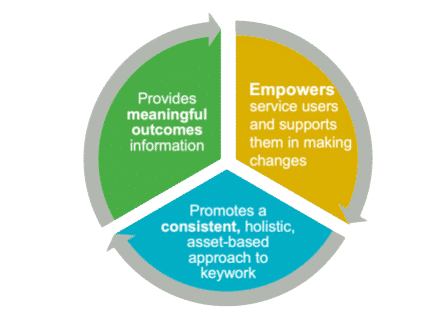
Family Star is a useful tool for all stakeholder.. Families, Practitioners, Funders and Commissioners.

The Star is a holistic tool – it is visual, parent friendly, acknowledges strengths and addresses barriers to engagement.
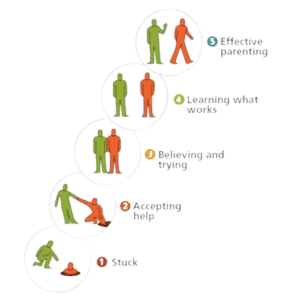
The scales on the Star represent a Theory of Change rather than a score out of 5 or how ‘good’ you are at a particular aspect of parenting.
Family Star is part of a suite of outcomes tools. It is an evidence based holistic tool and provides a baseline and regular review points to measure change across all aspects of parenting and family life. The action plan agreed between the Family Practitioner and the parent forms the basis of the intervention. Action Plans are SMART and represent small, manageable steps toward an agreed goal that gives positive outcomes for the family and this prevents problems getting worse.
Part of the launch of the service involved information sheets being sent to key partners, followed by presentations via Zoom or Teams to key teams such as health visitors, Family Thrive and Children’s Social Care, in order to ensure that referrals into the new service took account of the change of level.
The review took place between November 2021 to April 2022 during which Impact Matters CIC conducted interviews with parents, the staff team and managers of the service.
Aims of the Year 1 Review
Reflect on the new service and how it is working – what works well and what could be improved.
Gather and present feedback from families about the benefits of the service for children and parents.
Showcase the work of the team – highlighting good the work carried out and build on experience.
Provide a visual and engaging resource to showcase the service and share with stakeholders and commissioners.
Methods: Feedback from Families
Seven families who had completed their support plan with The Family Practitioner Service were identified by practitioners to participate in the review. The families gave their permission to be contacted by Impact Matters and this was facilitated by the family practitioner.
Each family was met individually: 4 families were met face to face in local venues: 2 in a LCFC Children’s Centre, 1 in a local park and 1 in a community café. 2 families were ’met’ on Zoom and 1 parent on the phone.
Feedback was gathered through informal interviews with parents, following a set of guiding questions. This method enables respondents to talk in depth about their experience using their own words. It gives the opportunity to gain deeper understanding and also enables the researcher to ask for clarification.
The feedback was audio recorded with the parents’ permission and transcribed by Impact Matters.
'The practitioner was reliable and consistent - doing what they said they would do and letting the parent know if it couldn't be done'.
'They really listened - and showed that they had heard me'.
'They showed warmth, empathy and understanding – were non-judgemental and cared about my family'.
'Pace – they kept the pace of support going, and didn't allow things to drift'.
'They treated me as an important human being'.
'They were clear about what the service could and couldn’t provide'.
Focus of the Interviews with Parents
- The benefits of the support for parents and child or children – bearing in mind the short time span of the support offered
- What has changed as a result of the support / what would have happened if the support had not been available
- How the service links in with other agencies where relevant
- Are outcomes sustainable
What kind of issues have families had support with?
- Immediate practical needs – linking to local services such as food banks, age appropriate clothes and toys for families with limited financial resources, supporting families to access doctors and dentists and other relevant medical support, providing information and advice about the borough’s services
- Supporting families to access Children’s Centres and other local services, particularly when isolated and/or new to the borough, including health services, SEND support, nursery and school, help accessing ESOL classes and interpretation services for families with limited English
- Regular 1:1 support to the family early to prevent problems escalating to more specialist services (for example at Family Thrive level). This includes help, advice and signposting for children’s routines and behaviour, communication and developmental milestones
- Supporting parents to improve mental health and emotional wellbeing; acknowledging the impact this has on both the parent and the child
- Helping families to navigate systems, and services to meet their needs, including support with appointments, form-filling and online registrations
- During the Family Practitioner interventions if needs are identified for any of our targeted parenting or domestic abuse programs then we can support the referral process
Skills and Qualities of a Practitioner – Parent Reflection
All seven families interviewed spoke very highly of the skills and qualities of the practitioners who supported them and greatly valued the practical and emotional support they received. They described how the support benefited both themselves and their child/children.
As part of the review, we asked parents to comment on the ‘magic ingredients’ that make up their successful support process: we were struck by how all the families commented on the qualities of the worker and the relationship and trust that was developed as a prerequisite for support.
To be treated as an important human being
Warmth, Empathy and Understanding – being non-judgemental and caring about the family
For the practitioner to be reliable and consistent – doing what you say you will do and letting the parent know if it can’t be done
Clarity about what she could do and what she couldn’t do (in terms of what the service can provide)
Pace – keeping the pace of support going, not allowing things to drift
Encouraging the parent to keep the pace going to move things on from their side
Really listening – and showing that you have heard
Giving families hope and a plan
Summary of Outcomes – Family Snapshots
The following snapshots highlight the range of support families have received in their own words, alongside a summary of their Family Star outcomes. You can view each families’ star outcomes by clicking the purple star to see how the service has supported the parent to change. You can read each families’ case study by clicking the button.
Click on a Star to view
Click on Case Study to read

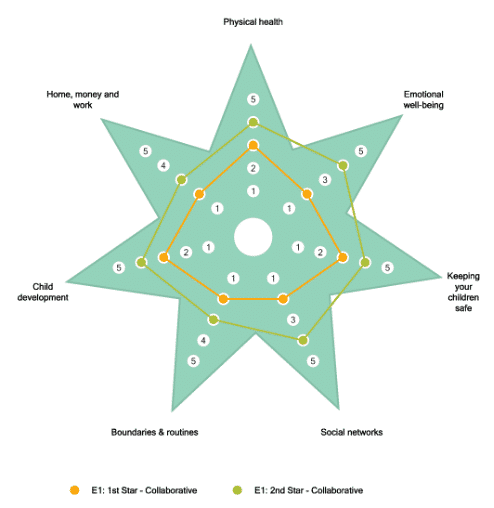
Family 1: Mother and 2 children aged 4 years and 8 months. The family needed help with mums depression and anxiety which was also affecting her relationship and emotional availability for her 2 children. Mum also suffers from frequent migraines. Mums emotional wellbeing and physical health has affected the families routines and social networks and they are quite isolated. The family lives in one room and there is a small baby who wakes often through the night to feed.
‘I’m depressed for a long time. Last September, it was very tough for me and I needed help with my children, the Health Visitor made the referral’.
The family made significant progress across all areas of family life. The biggest progress was in Social Networks and Emotional Wellbeing with a change of 2 points on the journey of change and the family moving from Accepting Help through Believing & Trying to Finding What Works. In all other areas of the star there was a change of 1 point – which is also a big improvement.
‘All the support x gave was fantastic. She didn’t work with me like stranger, it was like family’ so when she said she was going to stop I was very sad. It’s tough to find someone like that. People don’t usually care .. it’s their job and that’s it’
‘My daughter who is 4 years has a lot of energy, so she tried to teach me how to behave with my daughter because sometimes I would shout at her. I calmed down and she didn’t judge me, I was like her daughter building a relationship’
The parent described the dilemma about the length of support:
‘6 weeks is too short but if you do a longer term I need to react and I need to start doing things myself, if it’s too long you will take longer to stand up and respond. X says she is going so I need to do the work before she goes.
The time was short I don’t like it, but it was good as well’ Mum explained that although she would prefer the support to continue, she acknowledged that it gave her the impetus to move forward: and this avoided the support drifting and developing dependency.
‘X would chase me – she would ask if I had done something and if I said I would do it tomorrow, she would say no, do it today, we don’t have much time’.
What changed: ‘I try to change how I act with my daughter; I try to make the relationship better. When I started, I didn’t go out but now I am smiling more and going out a little bit, going to the children’s centre. I was zero, now I am 10% which is a lot for me’.
X helped her find a new nursery place for her daughter and also linked her up with a service in the borough to help her with getting a British Passport.
Impact on Baby: ‘it has helped him because I’m breastfeeding, so I don’t get a lot of rest, so before I try to rest in the day and not play with him. Now I don’t take that excuse even if it’s only 20mins I will play with him, I know this is important for our relationship and his development’.
Family Star: ‘It was helpful, last time when we did the second star I didn’t recognise where I was at the beginning, how much we did……. It gives you self-importance and confidence, so you know how far you’ve come and what you have done – it gives you a push’.
It gave her confidence about asking for support in the future.
I don’t know if everyone in the job is like x, but it is important to put your heart in, you need to be a human being in the first place. Also, x does what she says she will do. Everything she said she did’.
Mum explained she has had the experience of being let down by other professionals, if they said they will call tomorrow perhaps they don’t realise that we are waiting for you to call.
‘She gave me hope. I didn’t think that someone – apart from my family or friends – who doesn’t know me would help me like my family. My family isn’t here. So, if tomorrow I can help someone I will do with all my energy, it’s like education too’.


Family 2: The family consists of a mother and 2.5 year old son who were referred for support by the Speech and Language Therapist for her son. The mother needed help with her mental health and with her child’s behaviour, communication, and developmental milestones.
The family made significant progress across 5 areas of family life: Home, Money & work, Child Development, Boundaries & Routines, Social Networks and Emotional Wellbeing. The biggest changes were in Emotional Wellbeing and Boundaries and Routines with progress of 2 points on the journey of change for each, moving from Accepting Help to Finding What Works.
‘’I was a bit sceptical at first as I didn’t know what to expect. I was apprehensive about opening up to her and explaining how I was feeling but after the first session I really enjoyed it – just having that listening ear, and no judgment, that was very crucial for me in that point of time. Especially about being a mother. I was encouraged to carry on working with her. We spoke every 2 weeks. It was amazing. She doesn’t know the Impact she has had on me in that time, because of what I was going through and because of my son and his educational needs… just having her there and running things by her, asking for her opinion and perspective and getting her advice’.
‘She checked in and made sure I was ok. Sometimes in life you just don’t have all the answers and checking that someone is ok is vital especially in their vulnerable moments and x did that for me. I will always be grateful to her -when my son grows up, I will explain the whole situation to him our story, about giving birth to him about him being a baby and me being a single mum and I will always include x name in that story because of the impact’.
‘I don’t think she realises how she saved me from my thoughts and how I was feeling and everything going wrong in my life. And towards the end of the support things started to pick up and that was amazing’.
Thinking back what have been the magic ingredients of the support you have had?
‘I don’t open up to people, I am very private and don’t like to tell people my business, but she was an angel, she helped and assisted me’.
Tangible changes: ‘We went through a Family Star together, at first it was all over the place and towards the end it was coming out as a balanced star, she guided me through sleep routines, we spoke about what was going on about work, finances, she guided me through each step – I know certain things weren’t working but seeing it visually really helped and at the end you could look back and see how things have improved and where I need to carry on improving’.
‘She was very consistent that’s key, she would check in with me. She actually remembered me and showed me she was always there with no judgement. I felt comfortable and I could talk freely, she would repeat what I said so I knew she was really listening to me. She knows how things work e.g. how the nursery work, how services work’.
It made a big difference to my son – I’ve seen such a big differences, the tips and how to deal with autism though he’s not diagnosed yet, so sleep and coping mechanisms, I had no idea as he is my first child’.
‘I felt ashamed and embarrassed to reach out and get that support, she always encouraged me and it’s like a weight has lifted off my shoulder’.


Family 3: A new mother and daughter were referred through the midwives for support with the mothers mental health. ‘The Referral was a quick process through the midwives. The main thing was my mental health – family issues and housing issues. The main things that were disturbing me have been sorted out’.
‘I’ve seen a lot of impact in my life, activities for parents to go to, she helped me with my finances, the food bank that I didn’t know was there’.
The family have made significant progress in Emotional Wellbeing, Child Development, Physical Health, with a change of 1 point on the journey of change and 2 points in Social Networks.
Since completing the support the family have been in touch to say that they have been re housed by Lewisham (this is not represented in the star).
‘She was absolutely fantastic, she was very open minded, understanding and caring. As much as she was doing her job, I didn’t feel like I was being investigated. I felt like I had a personal relationship with her’.
‘This was important to me because I don’t have any family around. I was really struggling in the beginning with my daughter and I had other issues going on like housing issues. It really had a mental issue for me. So having x helped to take a burden away without feeling judged’.
Thinking back what have been the magic ingredients of the support you have received?
‘The magic ingredients, the relationship was a prerequisite for the quality of the support. As much as you are keeping things professional, be open minded allow people to express themselves without feeling they are being judged. She gave me space to express myself the way I wanted to express myself. If every worker could be like that it would make a lot of difference. Sometimes she would phone me randomly to check in and that also made a lot of difference. Everything worked quickly I would send her messages or emails and she would respond quickly’.
‘Impact on my child – I’m not too good at being social with people and I worry about my accent. I lost friends around me because of having a child. X introduced me and my daughter to a Children’s Centre and the activities have been great as well as helping me with my mental health – getting out of the house and thinking about something else.’
‘Family Star is helpful – when you have to rate yourself, you have to reflect and you realise where you are, it’s good for reflection and also the things that are going well – your strong points – an opportunity to reflect on your life’.
‘I recommend to other people – every parent needs this, it’s very important. Once you have a child a lot goes on mentally, physically and spiritually, people don’t have the opportunity to talk about this and it can affect your relationship with your child. You get to see the brighter side of having a child’.


Family 4: Mum lives in one room in a hostel for refugees with her 3 children, 2 sons aged 8 and 5 years and a daughter aged 3 years. The family came to the UK a year ago and mum is finding it tough. They have limited money and the family is isolated. They were referred by the health visitor for help making social contacts to reduce their isolation, help mums emotional wellbeing and for practical support with clothes, food bank, toys.
The family have made significant progress in Home, Money & work, Emotional Wellbeing and Social Networks. Emotional Wellbeing and Social Networks have both improved by 2 points on the journey of change, moving from Accepting Help, through Believing & Trying to Finding What Works.
Mum and her 3 year old has been coming every Tuesday to the Children’s Centre for a dedicated session for the families at Pentland House. The practitioners accompany the families on the bus whilst the rest of the team set up the play session. She has received clothes, story books and puzzles from the play sessions for the families at Pentland House on a Tuesday morning.
Mum says her daughter really enjoys it and every time she is here, she is happy. We met in the same playroom for this feedback and as soon as they came in the daughter immediately made herself at home, really engaging with the space and the different areas and playing with the resources.
When she first started coming, she was very shy and quiet, ‘x said I should try to make new friends. Before I went to school, I didn’t say anything to anyone. Now I try to speak to people, to say hi and now I’m getting to know people’.
‘Yesterday one of the other mums invited my elder son (8 years) to a birthday party’.
Mum said she didn’t know about children’s centres or what the building was if she walked past it. She is ‘finding out lots of different things for her daughter because when she is here at the group, she is happy’.
Best thing about the support: ‘It was the first day we came here I really enjoyed it and she told her brothers all about it, the toys she played with and what she had drawn’.
‘It will make it easier for her to go to school. When she goes to school, she will be able to learn fast’.


Family 5: The family consists of mum, dad and son aged 3. Mum is pregnant and about to give birth soon. The family live in one room in dads mothers house. Dad speaks English and works; mum has limited English and has recently come to live in the UK. The family were referred for help with accessing the children’s centre, ESOL for mum, reducing the family’s isolation and opportunities for the son to socialise with other children.
The family have made significant progress in Social Networks, with a change of 2 points on the journey of change: moving from Accepting Help through Believing & Trying through to Finding What Works. In Boundaries & Routines the family progressed one point from Finding What Works to Effective Parenting – this is also a significant change.
The father interpreted for the mother as she has limited English. He explained that they wouldn’t have had the advice and help without x. Both parents felt that 6 weeks was not long enough though especially because of the language barrier – he asked ‘Is it possible I could have more days’.
The practitioner helped the family to access the centre for their son and he enjoyed playing with the toys / resources and the other children. The mum has started ESOL which the practitioner organised for her.
The support has made a difference for the son: ‘he’s very happy when he is here but on the other days, he needs something. He needs help with language – when he comes to the Children’s Centre he is playing with the toys, especially the animals and likes to cut up the fruit and singing together. He’s starting to say numbers and animals names, writing the number 5. He has 3 languages, Arabic (mum) Somali (dad) and English -and uses both, for example will say five in English and fish in Somali’.
They would like help to get a nursery place and more access to the children’s centre. The family are not able to access funding for a nursery place as father works, but he will be able to attend in September.
They would also like help applying for housing – as they live with the husbands family, all 3 are in one room and expecting another child.
The practitioner organised age appropriate clothes and toys for the son – but as the father wasn’t there when they arrived the mum refused them (it was unclear whether she understood or not). Mum has started ESOL classes.
They were aware of Family Star ‘a little bit big change, its different from then to now as she didn’t know what to do or where to go and now she knows how to get to ESOL and bring our son to the Children’s Centre’.
Father says she is still quite unconfident and nervous about delivery of the baby, especially as first son was born by caesarean in another country.

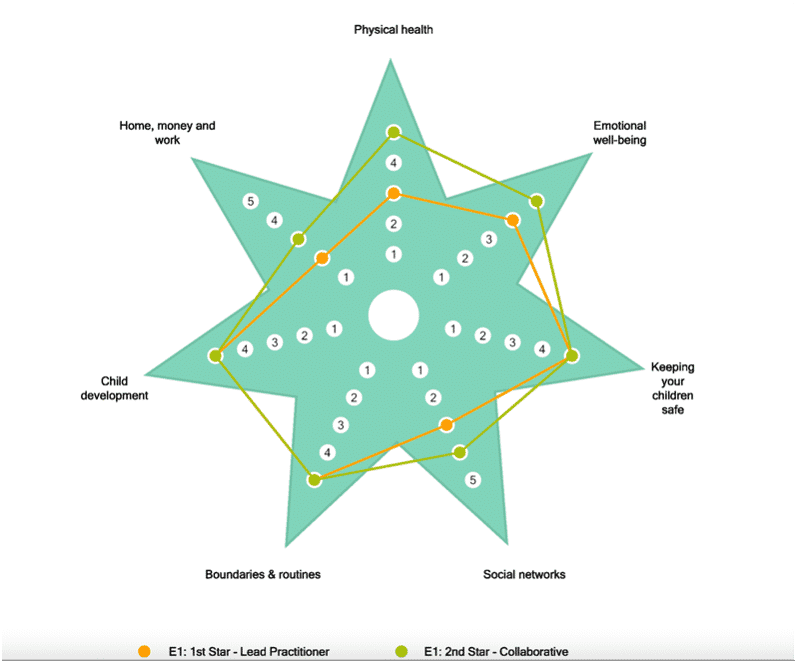
Family 6: The family are Spanish speaking refugees from South America, living in the Lee Home Office Hotel. They have a 7 year old son and Mum is pregnant with her second child. Both parents have very little English, the interview was carried out face to face with the aid of a telephone interpreter.
The star shows significant progress for Family 6 in 4 areas of family life: Physical Health (with a very big change of 2 points on the journey of change, from Believing & Trying to Effective Parenting), followed by 1 point on the journey of change in Emotional Wellbeing, Social Networks and Home, Money and Work.
The first Family Star Early years was completed as a Professional only star using information gathered from the telephone script with help from the telephone interpreter. The second star was completed collaboratively.
Father is learning English and mother has just started too: ‘One of the first things x helped with was about the language – she helped us get help learning English’.
The practitioner ‘has been a great help to us, she has tried to help us in everything, we are very grateful for her time’.
‘She has got us an appointment with a dentist and an optician – mother and son now have glasses. We didn’t know how to do this and we would still be looking for places to go for dentist and glasses for my son and wife, we weren’t able to find anyone who could help us so quickly’.
‘6 weeks is too short and it went really fast, having her here has been great. We have got a lot of advice about what to do next, we know where our nearest children’s centre is and what activities they to access once the new baby has been born’.
‘They explained that the practitioners support has given them confidence to access the children’s centre. We met x in the children’s centre, so we know where it is. We know what to do to take care of our son and the new baby. We can look at the website for classes and weighing etc’.
Thinking back over the last 6 weeks what have been the magic ingredients of the support you have received?
‘X has been a part of our family, the relationship has been helpful, reliable, she was with us every step of the way. It is very isolating in a new country and being pregnant. And with a son who needs to go to school’.

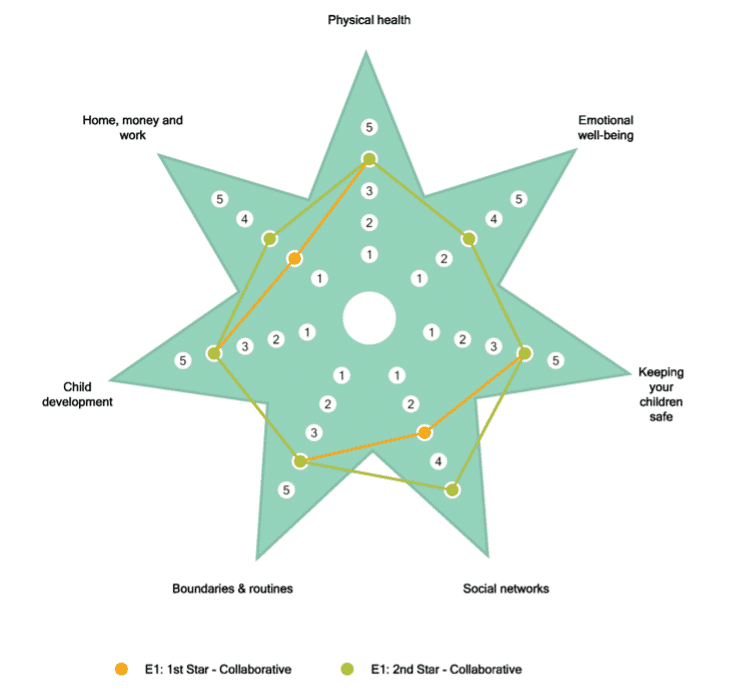
Family 7: Mother has mental health issues and had recently been admitted to a mental health facility for 28 days. During this time the 2 year old daughter was being looked after by dad. The family needed help supporting mums mental health after discharge, reducing isolation and increasing social networks for both mother and daughter. The family also needed practical support, including ESOL, access to the food bank, age appropriate clothes and toys for the daughter.
The family made significant progress in social networks with an increase of 2 points on the journey of change. This was followed by Home, Money and Work with the family progressing by 1 point from Accepting Help to Believing & Trying.
The father was extremely grateful for the support he had received from the practitioner since his wife was in hospital for depression. He described how she has been persistent with helping his wife – helping her access ESOL classes and accompanying her to the children’s centre so that their daughter can play with other children which she really enjoys. Supporting her to play and interact with her daughter has helped their relationship which has been impacted by mums mental illness. The practitioner also helped them access the food bank, a dentist also helped them access a nursery place for their daughter.
Reflections from the Family Practitioners Service team
The four family practitioners and a manager attended a two hour focus group on Zoom.
Year 1 of the new Family Practitioner model has taken place with a background of ongoing covid restrictions as well as being a newly configured service – for example with the team working from home and restrictions on home visits. Covid restrictions have affected all areas of work within the Children’s Centres and more widely across service partnerships – this should be kept in mind when considering the findings below.
At the time of writing the Year 1 review covid restrictions have been lifted nationally. At the same time concern around high rates of Covid infection in the community remains. LCFC are in the process of reviewing and planning services for the coming year in the light of these issues. This means Year 2 may look quite different to Year 1.
Focus of interviews with managers / focus group with practitioners
- To provide context and reflect on how the new contract has worked over the year
- To acknowledge the subtleties of the services
- Has the level of support identified at referral stage been appropriate for the service
- Whether 6 weeks is a reasonable amount of time to effect change
- Linking in with other agencies and services
Reflecting on the new Family Practitioner Service
A supportive team
The Family Practitioner team are a newly formed team. Three members of the team are new to both Early Years Alliance and Lewisham Children and Family Centres and were recruited within Year 1 for the Family Practitioner Service. One team member has been with both EYA and LCFC for some years.
All the staff agreed that they have developed a supportive team who value each other during year one. The managers ensure there are regular meet ups, team meetings, supervision etc and the experienced co-worker makes sure she checks in with members of the team each week to offer support and advice. This has been very valuable particularly as the team are working from home which otherwise could have been challenging and isolating.
Working from Home
The team have been working from home and organising their own work due to covid restrictions in place across LCFC. They have been contacting families by telephone, online via Zoom and meeting face to face in the children centres and in the community.
This has been very productive in terms of getting work completed and lack of distraction, however there are also challenges. ‘It is difficult to cut off and put boundaries around the hours you are doing so whilst there are good things, it’s so easy to say I’m just going to finish this and get it done’.
At the moment there are no home visits due to covid restrictions but going forward these will be resumed once the appropriate training, support and risk assessments have been reviewed and are in place. The team agree that it will be helpful to have at least one home visit with a family as this aids understanding of the family circumstances and will also help with the difficulties of finding appropriate meeting places in the community particularly with regard to privacy.
Outcomes for families
The feedback from families demonstrates the extremely valuable and effective work of the Family Practitioners and the recorded Family Star outcomes show the progress they have made in the short period of time allocated within the new model.
Practitioners discussed what makes a successful engagement with a family within the framework of the new model. There was a high level of congruence between the practitioners perspective and the families who were interviewed.
Magic Ingredients of a Successful Period of Support
Building Trust
Being warm / human
Talking with families not at them
Language – ‘working together’ rather than ‘I am supporting you’
Clarity: Being clear about what you can do and can’t do e.g. housing
Good communication felt part of the journey and I wasn’t dragging him along
Practitioner being active and proactive / following up on things that are taking time
Parent being active and proactive / engaged
Partnership – sharing the process with families to build in sustainable outcomes, e.g. sharing a map of nurseries and doing it together online in real time
Reassurance
Problem solving approach and sharing this with families
Looking to the future when the worker is no longer around
’When everything fits into place it’s like an adrenaline rush - it’s just amazing, everything works and it’s a success and you can achieve so much. That’s a brilliant part of the job. But on the other side it can be extremely frustrating and that is quite hard, it’s hard to get used to and say ok just relax you can’t do that right now’
‘I would say the balance between the professional and the friendly balance. Providing that warmth Promoting their independence and empowering them and being professional but also being a shoulder to cry on for some of these families. Mum needs a lot of emotional support; the weekly calls are really valuable and checking in with her’.
‘Really listening – no one has really heard them’.
'Time management. Building up knowledge and sharing resources e.g. a new charity that can do something for our families’.
‘Each family is really different – when you call someone for the first time you have no idea what they are going to be like’.
Family Star Early Years – Practioner Reflection
Practitioners find Family Star Early Years useful and family friendly, bringing a shared framework to the support and helping to structure conversations. Reflecting with parents about how much has changed over the period of support is also very valuable.
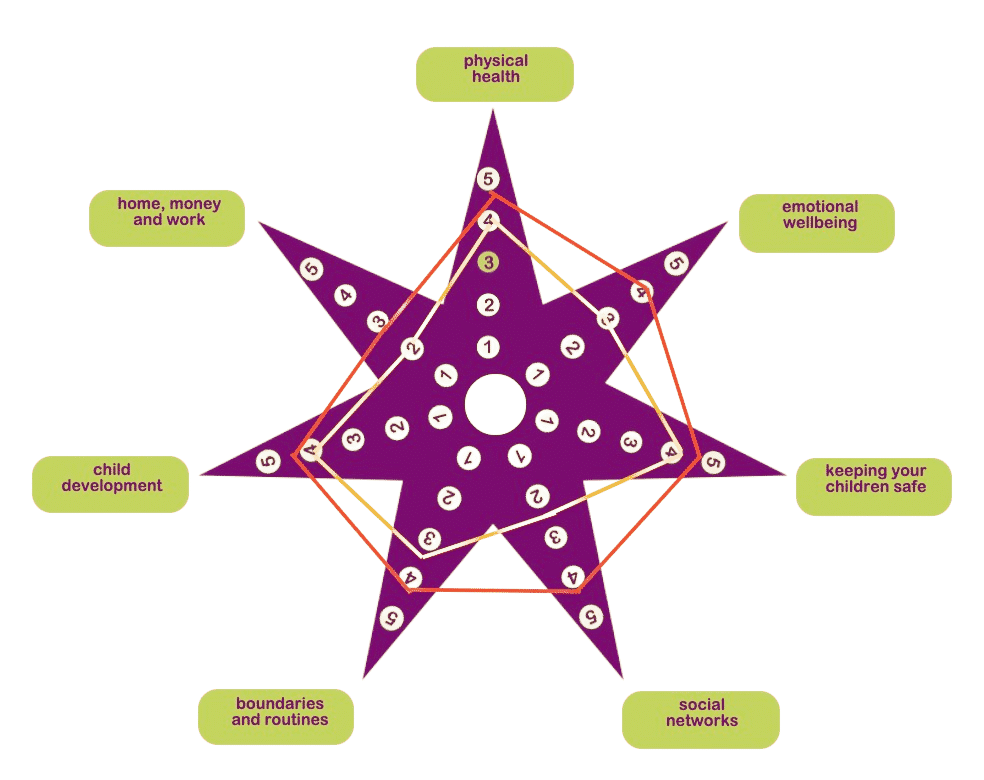
‘I think it’s great – the layout of it’.
‘It’s a really good structure for the conversation, it goes into different areas which you might not cover otherwise, you might miss something if it wasn’t structured like this. It’s then very useful for making the actions with the parent’.
‘The whole visual and being able to show them the second star and the improvement … how things have changed is great. It can take a bit of time for families to understand, especially if you are working with families with little or no English and if you are doing it via an interpreter that can be difficult’.
‘A nice reflection tool for the parents. It’s a nice tool for the parents when you say the journey of change and shows we are working together and for parents to see what we’ve done together’.
’Once they understand it, it makes them think about home life and the children, it breaks things down into different areas of our lives’.
6 Week Model of Support
The experience of the new service shows that whilst there are families where support has been closed within 6 weeks and meaningful outcomes have been achieved, for some families this can be a very short period of time to engage and effect sustainable change.
There are many elements to the 1 to 1 support process and the practitioner is not in control of them all and this can make a 6 week model difficult to achieve:
Building Trust: both practitioners and parents have said that relationship building and developing trust is an integral part of the process of support, ‘without this it’s hard to get anything done’. The model incorporates an additional week at the beginning to start the engagement with a family. However initial contact with a family can take longer than this. The parent can be ambivalent or unsure, on the one hand wanting and needing support but on the other hand hard to contact. There may be a gap between the family’s perception of the support they require and the referral. It can take time to establish this with a family and map out the support.
Level of support required for the family: the 6-week model is predicated on families needing a lower level of support – below the threshold for targeted support from the local authority’s newly formed Family Thrive Team. However referrals are not always appropriate for this level of support. Sometimes this is established at the start of the referral pathway, alternatively it can become apparent later in the support process – families can open up about deeper or more sensitive issues further into the support once trust and confidence has been established.
Linking in with other agencies and services; it can take time for families to be linked into other services that they need to access, these timescales are outside the practitioners control.
Whilst there are often mitigating circumstances why cases need to remain open for longer, practitioners and families both acknowledged that having a timescale is helpful as it helps to keep up the pace of the support and avoid drift.
Conclusions and Next Steps
The Review of Year 1 of the Family Practitioner service has highlighted the benefits and outcomes of the service for families. Families themselves and practitioners have identified the magic ingredients of successful and effective practice, and clearly the service is both valued and needed.
Part of the reflection at the end of the year suggests that there is a need for a mix of both the more targeted level of support as well as the lower level response currently offered by the service.
Going forward into Year 2 therefore, LCFC are proposing to incorporate more flexibility around the threshold for family support from FPS and also to extend the timescale to an 8 – 10 week model for families.
This takes into account the needs of families, the skills of the team and the additional services surrounding the Family Practitioner Service (eg LCFC Domestic Abuse Service and Parenting programmes). It will enable the FPS to work at different levels as appropriate to the referral and needs of the family. LCFC will also further explore the referral pathway for families to establish the difference between the original reason for referral and the support actually received once the team have carried out their holistic assessment with the family.


